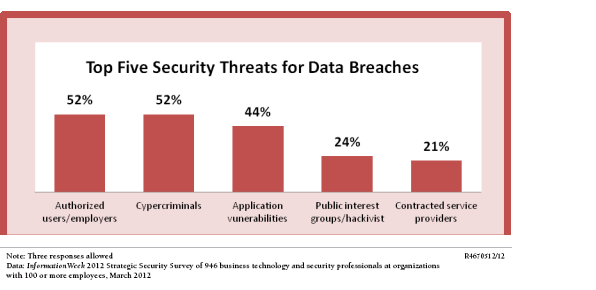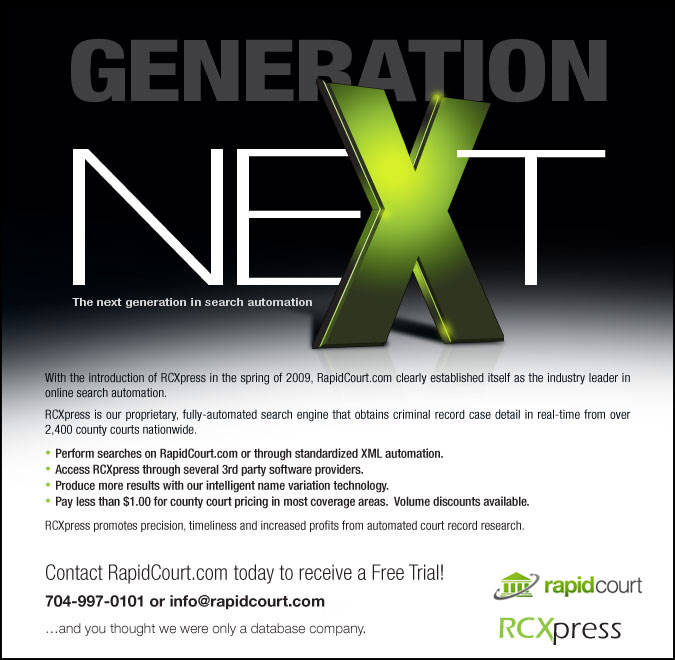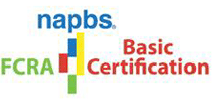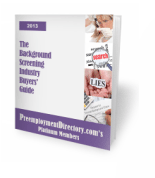| BACKGROUND
SCREENING NEWS |
New
Workforce, New Tools
Background screening is a critical component of any talent acquisition
strategy. Without a standard and efficient approach to compiling
and authenticating candidate information, organizations will
lose their best talent and become vulnerable to risk and compliance
issues. Yet, according to Aberdeen's talent acquisition research,
only 4% of organizations cited background screening as the top
talent acquisition priority in 2012. In today's highly competitive
market, HR leaders need to think more strategically about background
screening-particularly around their technology investments.
Many organizations are only investing in screening at specific
job levels, while others fail to invest in credible providers
that provide accurate information on candidates. With a new
set of regulations and an increasing number of dubious providers
offering inaccurate information on potential candidates, organizations
can no longer afford a haphazard approach to screening. The
top criteria used to select a provider include accuracy, turn-around
time, compliance and customer service. Additional criteria that
organizations should consider include globalization, social
media, a positive candidate experience, and total talent acquisition.
Read
more

To Screen or Not to Screen?
According to HireRight's 2012 Employment Screening Benchmarking
Report, 34% of respondents perform background checks on current
employees, and experts in the field believe the trend is growing.
It's a step toward furthering risk management and maintaining
a safe working environment for employees and clients. "Since
a background check is a snapshot in time, employers should be
interested in ongoing screening to help identify employees who
may commit crimes that would have precluded their initial hire,"
notes Steven James, founder and chief operating officer of Background
Profiles. Certain industries are more prone to receive the value
of investing in annual background screens such as in the health
care, transportation, and financial services industries. Various
factors should be taken into consideration if your organization
moves forward with annual background screening: Consent is key;
Keep cost and relevancy in mind; Think about compliance; Communicate
and be consistent; Contractors count too. And if every year
isn't in your budget, think about spacing apart total workforce
screens every two years.
Read
more

These
5 Trends Are Shaping the Future of Pre-hire Assessments
2013 is
going to present the start of a major tipping point in the way
people find jobs and are evaluated for jobs, and a blend of
technology and assessment content will play a big role in these
ongoing changes. This opinion is not founded on trends within
the pre-hire assessment industry, but rather on the bigger picture
of emerging trends in Internet technology: Social Connectivity;
Collective Intelligence; Gamification; Credentialing; and Entrepreneurial
Culture. The ability of data to drive useful connections with
others who share the same interests and the ability to share
information across relationships is rapidly gaining teeth. It
is now possible to use personal preferences, connections, and
interests to provide meaningful insights into almost everything.
In terms of hiring, connectivity continues to make sourcing
(and job searching) easier. The emerging Internet has introduced
many sites and businesses who offer the ability to collect input
from multiple persons, aggregate the data, and report on it
such that one overall opinion creates an accurate representation
of the views of many. When combined with increases in connectivity,
we gain the ability to collect insight about a person, product,
or service that may not be exactly in line with what is outwardly
represented.
Read more

State
Pushing for Federal Background Checks at Daycares
A CBS Atlanta
News investigation revealed that 24,000 daycare workers in Georgia
are on the job without having undergone a federal background
check. A local background check is currently all that is required
by the state. Kellen Stennett, owner of The Goddard School in
Buckhead, said that he believes the state should require more
thorough background checks on daycare workers. In response,
the Georgia Department of Early Care and Learning is pushing
new legislation to require a federal fingerprinting background
check. They receive more than 100 complaints a month related
to possible inappropriate activity at daycare centers. "The
federal background checks are a little bit more complicated,"
said Stennett. "They cost a lot more money, they take a lot
longer to get the results back so particularly if you're looking
to make a quick hire or something like that it can be restricting."
Georgia is expecting lawmakers to pass legislation this session
to strengthen background checks.
Read more



| DATA
PROTECTION & PRIVACY |
Kick-Starting
a Privacy Program
It is not
enough for a business to create a privacy policy and place it
on its website; a business must define policies and practices,
verify that their employees are following the practices and
complying with policies, and confirm that third-party service
providers are adequately protecting any shared information as
well. As customer demands and regulatory requirements change,
the business' privacy practices and policies must be reviewed
and revised to meet this changing business environment.
So, how
do you get started? Well, every journey begins with the first
step. Here are 10 steps to kick-start your organization's privacy
program.
Read
more

Guarding
Privacy in the Digital Age: Maine Lawmakers Take up the Challenge
As more
and more of our personal information is shared, it is also at
risk. The American Civil Liberties Union of Maine and a group
of bipartisan legislators have unveiled a new package of laws
aimed at better protecting Mainers' privacy. Maine legislator
Diane Russell's bill - The Maine Online Privacy Protection Act
- would require commercial websites to conspicuously let Maine
consumers know when personal information is being collected
and shared. Republican Rep. Mike McClellan, wants to protect
social media privacy at work. His bill would block employers
from getting passwords to their employee's social media accounts,
something that's already happening. These are just two of a
package of five bills with bipartisan support that aim to protect
personal privacy. The others would limit drone use for domestic
spying and require law enforcement to get warrants before they
can track cell phone data and text messages. With identity theft
being one of the fastest growing crimes in the U.S., it's time
for laws to catch up with technology. While these bills have
bipartisan sponsors, it's unclear whether there will be support
from businesses or law enforcement.
Read
more

Top
Five Information Security Threats to Data

To
see the full survey results

New
Attention is Given to Privacy Trade Issues
Privacy
and trade will be considered as linked issues during the looming
EU-U.S. trade negotiations, reports Hogan Lovells privacy leader
Chris Wolf in
one of the inaugural blog posts on the first-ever blog
of the International Association of Privacy Professionals, Privacy
Perspectives, which just launched. An investigation has
begun at the United States International Trade Commission that
will examine the impact of privacy regulations on digital free
trade and as the negotiation of a EU-U.S. Free Trade Agreement
soon will begin-a negotiation that inevitably will look at the
issue of the compatibility of privacy laws on both sides of
the Atlantic, and that likely will put data protection harmonization
on the negotiating table.
Read more

States
Focus on Reducing Employer’s Access to Social Media
Increasing numbers of Americans use social media both on and
off the job. Recently, some employers have asked employees to
turn over their usernames or passwords for their personal accounts.
Some employers argue that access to personal accounts is needed
to protect proprietary information or trade secrets, to comply
with federal financial regulations, or to prevent the employer
from being exposed to legal liabilities. But others consider
requiring access to personal accounts an invasion of employee
privacy.
State lawmakers introduced
legislation beginning in 2012 to prevent employers from requesting
passwords to personal Internet accounts—including email,
banking and social networking sites—to get or keep a job.
Some states have similar legislation to protect students in
public colleges and universities from having to grant access
to their social networking accounts.
To
see a full list of pending bills by state

So far during
the 21st century there have been more than 9,000
people who were either murdered or killed themselves
at work.
Source:
2013 Workplace Violence Fact Sheet

| Welcome
to the U.S. Legal Challenge Question! |
Sponsored By:


As the background
screening industry continues to get more competitive the firms
that will ultimately succeed will be those that create competitive
advantage through their people by offering continuous learning
opportunities to heightened their knowledge and capabilities.
We believe that having employees that are very knowledgeable about
the legal landscape of background screening is essential to continued
success.
We are grateful
to Pam Devata, Seyfarth Shaw
LLP for providing the expertise for this valuable endeavor.
For information regarding the answers to the Legal Challenge Questions,
please contact Pamela Devata at Seyfarth Shaw LLP at pdevata@seyfarth.com
or 312-460-5000 or visit www.seyfarth.com.
Please choose
your answer by clicking on it:

What
Employers Need to Know About New York's Beefed-up Social Security
Number Protection Law
New York
Governor Andrew Cuomo recently signed an amendment to the state's
Social Security Number Protection Law. The amendment is designed
to strengthen consumer privacy and protect against identify theft.
The amendment prohibits a person, firm, partnership or other business
entity from requiring an individual to disclose or furnish his
or her Social Security number for any purpose, and from refusing
any service, privilege or right to an individual because the individual
refuses to disclose his or her number. The amendment includes
an exception which allows employers to request an individual's
Social Security number in the course of the administration of
a claim, benefit or procedure related to the individual's employment;
in the course of procedures related to retirement from employment
or injury suffered during the course of employment; or to check
on an unemployment insurance claim. It also allows employers to
request a Social Security number to conduct a criminal or other
background check permitted by New York State law, where the individual
consents to its use, where it is being requested for the purposes
of collecting child support, etc. Failure to comply with the law
can result in a fine of up to $500 for the first violation and
up to $1,000 dollars for any further violation.
Read more

Kmart
Settles FCRA Class Action for $3 Million
Kmart Corporation
has agreed to a $3 million settlement stemming from allegations
that it violated the Fair Credit Reporting Act (FCRA) when using
background checks to make employment decisions. The class-action
suit alleged Kmart violated the FCRA by failing to provide "certain
specific disclosures before it use[d] the report for an adverse
action." The putative class action complaint argued that a purpose
of the FCRA is to grant consumers a meaningful opportunity to
correct inaccuracies and omissions in background reports before
employers take adverse employment actions. In the case, the plaintiff's
rights under the FCRA were undermined when Kmart deprived them
of an opportunity to make such a correction. Kmart has denied
any fault, wrongdoing or liability whatsoever, but will pay $3
million and will be granted a 'narrow release' covering only the
FCRA claims.
Read more

The
In-House Lawyer's Guide To Marijuana Legalization: How
Companies Should Clarify Their Policies, And What To Look Out
For On The Enforcement Front
In the recent
November elections voters in Washington state and Colorado voted
to legalize the recreational use of marijuana. What does
that mean for company drug policies? Should I panic?
Zero-tolerance
drug policies should still be fine. So should drug testing programs.
The courts have so far upheld employers' rights to enforce drug-free
workplaces, even if an employee is legally taking medical marijuana.
"Go ahead and enforce your zero-tolerance drug policies regardless
of the reason for marijuana use, whether medical or recreational,
without regard to the new state laws," says Richard Meneghello,
a partner at Fisher & Phillips.
However,
employers in Arizona, Connecticut, Rhode Island and Maine should
be careful. These states all have laws that require employers
to accommodate medical marijuana, but though federal law may preempt
those measures, none has yet faced a court test. Unless you want
your company to be the test case, tread cautiously.
Read more

A
New Workplace Social-Networking Privacy Bill Surfaces In Philly
This proposed amendment to Title 9 of The Philadelphia Code, entitled
"Regulation of Businesses, Trades and Professions,"
would, in City Council's words, "add a new Chapter, protecting
social networking privacy, by prohibiting an employer from requesting
or requiring access, in any manner, to an employee's or prospective
employee's account or profile on a social networking site and
providing for enforcement and penalties, all under certain terms
and conditions."
Indeed, this
new bill is so broad that it could preclude HR from conducting
an effective investigating claims of harassment in the workplace.
The bill prohibits employers from requesting access to an employee's
Facebook account through a co-worker who is a Facebook friend.
Read
more

According
to a 'How Does Your Department Compare? study of HR practices
conducted by HRDailyAdvisor.com of those HR Departments that outsource
any function, the most frequently outsourced function is background
reference checks at 60%.
Source:
HRDailyAdvisor



Corporate
Screening Unveils New Search Product: CS HealthSweep
Corporate
Screening Services, Inc . (CS) is pleased to announce the
launch of its new product, CS HealthSweep. Customized by state,
this unique tool was developed to assist healthcare employers
by conducting a simultaneous primary source search of multiple
disciplinary action/sanction databases.
"States track
disciplinary actions and other sanctions through many different
agencies and associations. Our experience has shown that this
can make it a cumbersome process for healthcare employers to conduct
a reasonable and legally compliant search effort," said Greg Dubecky,
President of Corporate Screening. "We developed CS HealthSweep
to save healthcare employers time and administrative hassle. The
product is tailored to each state's requirements, and offers employers
the most efficient and accurate search methods available."
Read
more

Former
CRA Manager Joins the FRS Team
 FRS is very pleased to announce
that Nichole Disser has joined our team as a Strategic Account
Manager. Nichole brings with her 9+ years of experience in the
screening industry. Originally working with Pre-employment Assessments,
she quickly moved into the background arena serving in Operations
and Account Management for Pinkerton, ChoicePoint, LexisNexis
and Accurate Background. Nichole's focus will be on client advocacy
and communications, as well as product add-on sales. She will
be a key member of our Product Marketing Steering Team. Nichole
is also a member of the NAPBS Best Practices Committee concentrating
on the Litigation Avoidance and Drug Testing sub-committees, as
well as a new member of the National Association of Professional
Women. FRS is very pleased to announce
that Nichole Disser has joined our team as a Strategic Account
Manager. Nichole brings with her 9+ years of experience in the
screening industry. Originally working with Pre-employment Assessments,
she quickly moved into the background arena serving in Operations
and Account Management for Pinkerton, ChoicePoint, LexisNexis
and Accurate Background. Nichole's focus will be on client advocacy
and communications, as well as product add-on sales. She will
be a key member of our Product Marketing Steering Team. Nichole
is also a member of the NAPBS Best Practices Committee concentrating
on the Litigation Avoidance and Drug Testing sub-committees, as
well as a new member of the National Association of Professional
Women.
Nichole has
an excellent working knowledge in the ever-challenging area of
compliance for background screening, and we have already put her
skills to use in this area. At our recent user's conference, Nichole
led the two Compliance breakout sessions. She also spearheaded
the 2013 compliance education project to ensure that all of the
Consumer Reporting Agencies (CRAs) utilizing the FRS platform
were notified about upcoming changes with the Fair Credit Report
Act (FCRA) that took effect on January 1, 2013. Nichole has been
available to consult with our CRAs to assist with questions regarding
the changes, as well as information about the Consumer Financial
Protection Bureau (CFPB) and its new role with regard to the FCRA.
Read
More

Can
You Spot a Fake Reference?
Sites offering fake reference services continue to spring up,
raising questions over whether the process is flawed from the
outset, and whether it's time to up the ante and background-check
referees. According to background screening expert Jeff Wizceb,
the process of signing up for a fake reference is easy and these
sites are doing big business. Five tips for effective reference
checking include: At interview stage confirm with the candidate
who is the appropriate person to call. Do not rely on who is written
on the resume; If the referee to call is not the person noted
on the resume, ask the candidate why and ask for written permission
to contact the referee; Ensure you identify the person you are
talking to; never conduct reference checks on mobile telephone
numbers; Ask the dates of employment, but be sure not to offer
these yourself - get the referee to offer them. Ensure the questions
are relevant and open-ended rather than those requiring 'yes/no'
responses. You may need to do more than one reference check at
a single organization to rule out any personal issues, ill-feeling
between people, or importantly, a bona fide fake.
Read
more

How Reference Checks Can Help to Prevent Workplace Fraud
Employers
are often stunned to find that a valued employee has been committing
workplace fraud, but statistics show that it is often the most
trusted employees who steal. Many of these employees are terminated
without charges ever being filed, leaving them free to target
the next company and trusting employer. Introducing these fraudsters
into your organization can have devastating consequences. Aside
from workplace fraud, they can also open you up to legal trouble
and even bankruptcy. To ensure you aren't the next fraud target,
conduct a thorough reference check on potential employees before
you make a job offer. The degree of background investigation you
conduct on a potential employee should reflect the potential for
damage. Confirm past employment, confirm education that they claim
they have and actually call references. Depending on the level
of the job, you may also want to consider conducting criminal,
civil and bankruptcy checks. Background checks and verifications
can weed out some higher-risk employees and are the key components
of your company's fraud prevention program.
Read more

Colorado's
Marijuana "Legalization" Amendment Task Force OKs Recommendation
to Permit Employers to Terminate Employees for Off-Duty Marijuana
Use
A task force
convened by Colorado's governor to address issues arising out
of Amendment 64, a state constitutional amendment that purports
to legalize the recreational use of marijuana by adults in Colorado,
recommended that "employers may maintain, create new, or modify
existing policies in response to the passage" of the law. The
recommendation is a preliminary signal that even as the state
liberalizes its marijuana laws concerning medical and recreational
use, employers still may regulate all marijuana use, even off-duty
and off-premises use, by their employees. Although the task force's
recommendation lacks the force of law, its implications for employers
are important. Employers should review and update their drug policies
to ensure that employees understand that they apply to the use
of all drugs that are illegal under state or federal law, including
marijuana. Employers in others states seeking to enact liberalized
marijuana laws should work vigilantly to ensure that those measures
include strong, clear protections so they will be able to maintain,
change, and enforce their drug-free workplace, zero-tolerance,
random drug testing, and related policies.
Read more

Public
Record Update
Sponsored by:

Public
Record Update
By Mike Sankey, PRRN
| BRB's
FREE RESOURCE CENTER |
For the MOST
COMPREHENSIVE RESOURCE describing all access methods, restrictions,
fees, and search procedures on over 26,000 government and private
agencies visit the Public
Record Research System (PRRS-Web) . We provide the extensive
details and in-depth data you will not find doing a Google search!
| 
CRAHelpDesk
PO Box 27869
Tempe, AZ 85285
800-929-3811
Fax: 800-929-3810
mike@brbpublications.com
www.CRAHelpDesk.com
|
Compliance with the myriad of state laws is a complex
subject affecting CRAs and their clients. The State Rules
Register provides an uncomplicated explanation in plain
English of state laws for what is reportable to the client,
usable by the client, and the necessary steps to take
to be in compliance with state laws. Also included are
best practices, practical tips, and ongoing notification
when state and federal laws change. Create your own matrix
reports. Use the special Resource Tabs of Guidelines and
Special Instructions.
See
www.CRAHelpDesk.com.
We
Help Consumer Reporting Agencies |
For more information
contact Michael Sankey atmike@brbpublications.com
or visit www.brbpublications.com/updates.aspx




|
 |
|
Drug
Screening - A Breath Away from
Seeing a Finger Print Solution Is there an App for
that?
The
start of employment drug screening can be traced back
to the 80's and President Ronald Reagan. President Reagan
issues executive order 12564, on September 15th,
1986 and it established a goal of a Drug Free Federal
Workplace. This executive order only applied to Federal
employees but soon became adopted by private and public
enterprise. From the late 80's and into the 90's Drug
Free Workplace programs sprouted up in most of corporate
America. The standard for testing was urine. To this day,
urine is still considered the "gold-standard" for drug
screening and the only method allowable for Federal employees.
The private workforce has always looked for ways to have
more options for their Drug Free Workplace programs.
Hair
Drug Screening picked up steam in the 90's as an alternative
to the traditional urine screening. The biggest advantage
was the detection window of drugs was 90 days, instead
of the 3 days for urine (for most drugs). The biggest
drawback was the price tag, coming in at 3 times the price
of a urine screen. Many employees jumped on this technology
as it provided more of a lifestyle snapshot and not just
a look back to the last 3 days of the applicant's life.
In the mid 2000's Oral Fluid became the new in thing for
drug screening. Its biggest draw was it was easily collected
and could do so anywhere. There were no gender issues
as you had with urine, or running into "follicle challenged"
individuals with hair screens. The biggest drawback to
Oral Fluid was the detection time was around 24 hours,
which is 1/3 of the time of a typical urine screen. Many
Drug Free Workplace programs today use a mixture of these
methods, as each has advantages and disadvantages. When
they are used together in one program you are able to
use all of it to betterment of your program and company.
Fast
forward to today, the year is 2013 and what is next? All
signs point towards Finger Prints, Breath and Retina Scans.
Read
the full article

|
|
TODD
SHOULBERG
Director of Drug
Screening Services
Company
Statement:
ClearStar offers a suite of Occupational Health Screening
services to help you provide testing options for your
clients. With little effort, our drug screening services
can be deployed in any technology for a seamless customer
experience. Our staff of industry experts is dedicated
to the highest quality of customer service.
For
More Information:
ToddS@ClearStar.net
321.821.3383
main │ 321.216.3155 fax www.clearstar.net
|

 Kevin Coy is a Partner in the Washington
DC office of Arnall Golden Gregory LLP. Kevin
advises background screening companies and other clients on a
wide range of privacy and consumer regulatory issues, including
Fair Credit Reporting Act, Gramm Leach Bliley Act, Drivers' Privacy
Protection Act, and Dodd Frank Act compliance issues, as well
as data breach matters. Kevin also represents clients with matters
before the Federal Trade Commission, the Consumer Financial Protection
Bureau, and other consumer protection agencies. Kevin Coy is a Partner in the Washington
DC office of Arnall Golden Gregory LLP. Kevin
advises background screening companies and other clients on a
wide range of privacy and consumer regulatory issues, including
Fair Credit Reporting Act, Gramm Leach Bliley Act, Drivers' Privacy
Protection Act, and Dodd Frank Act compliance issues, as well
as data breach matters. Kevin also represents clients with matters
before the Federal Trade Commission, the Consumer Financial Protection
Bureau, and other consumer protection agencies.
Kevin can
be contacted at Kevin.Coy@agg.com
or 202-677-4034.
THE
WASHINGTON REPORT - February 2013
While the
new Congress in many respects is still just getting underway,
it has been a busy month in Washington when it comes to developments
which could result in long term impacts on background screeners,
even though screeners were not the primary focus of many of the
developments.
At
the FTC
On February
11th, the FTC released its most recent report to Congress-required
by the Fair and Accurate Credit Transactions Act of 2003-regarding
the accuracy of consumer credit reports. Headlines generated
by the report emphasized a finding that one in five credit reports
may contain an error, without noting another finding in the study
underlying the report that only 2.2% of the credit reports contained
an error sufficient to change the consumer's credit score risk
tier.
The night
before the public release of the FTC Report, CBS aired a "60 Minutes"
story-titled "40 million mistakes"--referencing the FTC Report
and highly critical of the reinvestigation practices of the three
national credit reporting systems. While the focus of the FTC
Report and the ensuing media attention is the three national credit
reporting systems, the report and the ensuing media coverage potentially
has important implications for all consumer reporting agencies,
including background screeners, because any changes in law or
regulation regarding accuracy or reinvestigation requirements
could impact all consumer reporting agencies, not just the three
national credit reporting systems
At
HUD
On February
8th, the Department of Housing and Urban Development
(HUD) issued a Final Rule implementing the Fair Housing Act's
"discriminatory effects" standard and raised the possibility of
future guidance regarding the use of arrest and conviction information
for tenant screening purposes. Similar to the disparate impact
doctrine supported by the Equal Employment Opportunity Commission
(EEOC), HUD long has interpreted the Fair Housing Act to prohibit
practices with an "unjustified discriminatory effect" without
regard to whether there was any intent to discriminate. The Final
Rule announced on February 8th is an effort to standardize
the application of the test nationwide, given variations in applicable
case law.
Read
More

One
Site! Many Suppliers! |
Get Your Copy of the Suppliers
Buyers Guide
Looking
for the Top Suppliers in the Industry? Need to find a new Supplier?
Visit our VENDOR
SHOWCASE which features suppliers to the Background
Screening Industry.
Suppliers
to the Background Screening industry Guide Now Available!
Click
here or on image to get a copy

Contact
Barry Nixon at wbnixon@aol.com
for information on getting your firm listed in the


The
Conference Board Employment Trends Index™ (ETI) Decreased
Slightly in January
The
Conference Board Employment Trends Index™
(ETI) edged down in January. The index now stands at 109.38, down
from 109.47 in December. The January figure is 2.7 percent higher
than a year ago. "Despite the dip in January, the Employment Trends
Index continues to signal a moderate improvement in the labor
market," said Gad Levanon, Director of Macroeconomic Research
at The Conference Board. "However, employment growth has outpaced
economic growth in recent months, and the ETI suggests that this
rapid pace of improvement in hiring may not continue in the coming
months."
Read
more

 January 2013:
ADP National Employment Report® January 2013:
ADP National Employment Report®
U.S. Economy
Added 192,000 Private-Sector Jobs in January, According to ADP
National Employment Report.
- See more
at: http://www.adpemploymentreport.com/#sthash.hchpeEwm.dpuf

STOP
STRUGGLING WITH WRITING AND PUBLISHING YOUR NEWSLETTER: |

We can help
you have a high quality e-newsletter to help nurture your relationship
with your clients and attract new clients. Our customized newsletter
service will take over your newsletter task or create a new one
for you. We can manage the creation of your newsletter for you.
We are constantly
researching information to use for The Background Buzz and
you can put our research to use for you. Using the information
rich content from The Background Buzz (minus the ads
and competitors information) we will create a custom newsletter
for you.
Use your staff’s
time to do more valuable work and save all the hassle of researching
or writing articles, formatting and managing all the other ezine
tasks with our customized ezine process.
Contact Barry
Nixon at 949-770-5264 or at wbnixon@aol.com
for more information.

Rhode
Island Dances with E-Verify Bill Again in H. 5236
A new House
Bill has been introduced that would impose a mandatory E-Verify
enrollment and use upon all employers who employ three or more
employees in the state of Rhode Island. The following employers
under this bill would be exempt: the federal government, employers
by another state, or another "political subdivision of Rhode Island
or another state." The following phases for participation in E-Verify
would go into effect if the bill were to be passed into law: On
or before January 1, 2014: Employers with 200 or more employees
required to participate; On or before July 1, 2014: Employers
with 50-199 employees required to participate; and, On or before
January 1, 2015: Employers with 3-49 employees required to participate.
Although the bill provides mechanisms for employers who enroll
in E-Verify to notify the State, the only penalty (thus far) for
failure to enroll in E-Verify appears to be getting referred by
the State's Department of Labor to the Immigration and Customs
Enforcement for non-compliance. The absence of a hefty penalty
provision may signal the legislature's willingness to compromise
in order to get the law passed. Finally, the bill may also reflect
the reality that the state itself lacks funding to finance an
enforcement team - a reality often faced by other states that
have imposed obligatory E-Verify laws.
Read more

Negotiate
with ICE - Reduce Those I-9 Fines!
When you
receive your first Notice of Intent to Fine (NIF) from a client
or a potential client, the process can be overwhelming for the
client and for you as counsel. If you are retained at the NIF
stage as attorney, actions taken by your client and by ICE from
the NOI (Notice of Inspection) to the NIF can have a significant
effect on the process moving forward. Remember there is still
time to negotiate at this stage. To reduce these fines, it is
important to keep photocopies of all of the I-9 forms and all
correspondence and documents turned over to ICE since the issuance
of the NOI. Document any discussions with the ICE agent or auditor
during the process. Always ask for an OCAHO (Office of the Chief
Administrative Hearing Officer) hearing and be organized and methodical.
Be prepared to argue the "Five Factors" to mitigate fines spelled
out in ICE's 2008 Guidance. Read prior OCAHO decisions and review
the regulations and existing guidance documents for exactly what
they say and don't say. Review the M-274 Handbook for Employers,
the I-9 Central on the USCIS website, and any other guidance on
worksite enforcement for inconsistencies that can be used in your
client's favor, and make a counter-offer to ICE.
Read more



Three Important Updates to E-Verify All Employers
Should Know
There are
three top latest developments that will ultimately (and significantly)
affect employers. 1. USCIS is monitoring your E-Verify usage:
Part of the enrollment process for E-Verify requires entering
into a Memorandum of Understanding with USCIS that includes allowing
USCIS to monitor an employer's E-Verify usage. USCIS is indeed
monitoring employer E-Verify usage to "detect, deter, and reduce
misuse, abuse, and fraud." In the event any misuse, abuse or fraud
is detected, USCIS will not issue fines but will refer employers
to the appropriate enforcement agencies for further investigation.
2. Heavier burdens directed at employers, including mandatory
E-Verify (or some version of it) on immigration reform: The real
debate remains how Congress would alter the existing E-Verify
program, if at all, or fold the program (as-is) into a mandatory
provision of immigration reform. 3. Alternatives to mandatory
E-Verify? Opponents of E-Verify, including the American Civil
Liberties Union (ACLU) who is concerned about the 1% error rate,
questions whether the government should be standing in the way
of an (authorized) worker and their new job and proposes the enforcement
of labor laws instead.
Read more

2012
OCAHO Decisions - Trends Every Employer Should Know
In 2012,
the Office of Chief Administrative Hearing Officer (OCAHO) issued
21 decisions. Of the 21 decisions, 11 were substantive decisions
concerning alleged violations of the Immigration Reform and Control
Act (IRCA), six decisions involved Office of Special Counsel issues
and four decisions were procedural. The most obvious trend in
the 11 substantive decisions is the level of success that employers
had in reducing the amounts of the fines/penalties sought by ICE.
In seven of the 11 cases, the issue of the amount of fines was
litigated and employers averaged a reduction of approximately
45%. The most common factors in the reduction of the fine were
an employer's ability to pay and/or the small size of the company.
In addition, employers tended to have success when challenging
I-9 fines on legal grounds. One of the surprising observations
is how few cases have been litigated before OCAHO in light of
the level of success achieved by employers. With the increase
in the number of cases from 2010 and 2011, this fact might be
changing.
Read more

|


|
APEC
and EU Bodies Discuss Regional Interoperability
The Asia-Pacific Economic Cooperation (APEC) announced
that Mexico has become the second formal participant of the APEC
Cross Border Privacy Rules (CBPR) System. APEC economic leaders
first endorsed the CBPR in November 2011 with the aim to promote
region-wide privacy policy compatibility, ensure consumer protection,
and lower regulatory compliance costs. Mexico's participation
follows the U.S., which was announced as the first formal participant
in July 2012. The U.S. has indicated that it is expecting its
first application from an organization seeking certification as
an APEC CBPR accountability agent. Some believe that a lack of
a 'culture of privacy' in countries such as Mexico could slow
down implementation of the CBPR system. Paula Bruening, Vice President
of Global Policy at the Centre for Information Policy Leadership
at Hunton & Williams, says the APEC has made remarkable progress
towards making practical implementation of cross border privacy
rules in the region a reality. She also noted that the APEC Data
Privacy Subgroup also discussed CBPRs for processors.
Read
more
Citizenship
and Immigration Canada Announces Start-up Visa Program
Citizenship,
Immigration and Multiculturalism Minister Citizen Jason Kenney
(the Immigration Minister) has announced that Citizenship and
Immigration Canada (CIC) will launch a Start-Up Visa Program to
recruit innovative immigrant entrepreneurs who will create new
jobs and spur economic growth. A "start-up" visa program differs
from existing investor and entrepreneur options to the extent
that the entrepreneur would not need to be the source of investment
capital. Such a program would enable entrepreneurs who establish
start-up businesses using capital contributed by third parties,
such as venture capital firms or angel investors, to seek permanent
residence in Canada. Pursuant to agreements signed with CIC, these
organizations will recommend which of their members should be
designated as eligible to participate in the Start-Up Visa Program,
establish expert peer review panels to assist CIC officers in
case determinations, and provide assurance that industry standards
of due diligence were followed. Foreign entrepreneurs will have
to meet certain criteria regarding language proficiency and educational
qualifications. The Start-Up Visa Program is a pilot program that
will commence on April 1, 2013, and will run for five years.
Read more
China's
Evolving Personal Data Privacy Landscape
The first ever national standard on personal data privacy
protection has come into force in China. The guidelines, called
the Information Security Technology - Guide for Personal Information
Protection within Public and Commercial Information Systems (Guidelines),
were originally proposed by the nation's telecoms regulator, the
Ministry of Industry and Information Technology in 2011 and subsequently
released by the Standardization Administration of China. The Guidelines
provide guidance on protecting personal information handled in
information systems and applies generally to the private sector.
While the Guidelines do not have the force of law, the introduction
of a general national standard on personal data privacy protection
marks a significant move for China. The China Software Evaluation
and Test Centre have announced it is forming a self-regulatory
group to play a consultative role in future legislation in the
personal data privacy arena. Organizations should take active
measures now to prepare their data collection, handling and processing/use
practices for compliance with the best practice Guidelines.
Read
more
European
Directives: Born and Bred
The largest
economy in the world isn't the United States or China, according
to the Central Intelligence Agency World Factbook. It's the European
Union. This group of 27 member states has also been at the forefront
of employment law trends, addressing topics ranging from conditions
of employment and leave laws, to digital data privacy protections.
For employers to conduct business in the world's largest economy,
HR professionals must know what the region's employment laws are
and how they are developed. Most EU employment laws are enacted
as directives. Like regulations, directives are binding on the
member states and have precedence over domestic laws. Don't make
the mistake of thinking they work like U.S. employment laws. Directives
don't tell companies how to treat employees, for example. Rather,
directives set an objective or policy and then "direct" the governments
of member states to take steps to meet that objective. A directive
sets a minimum standard or base line, and each EU member state
must pass legislation to give effect to that standard or base
line. There is a call for deregulation in response to the global
economic downturn and the need to increase competitiveness. Given
the already comprehensive coverage of EU employment law, such
a trend will be welcomed by employers.
Read more (SHRM Membership required
to access)
Amended
Data Protection Law Enters into Force
The amended
Ukrainian Data Protection Law - which came into force December
2012 - introduced new grounds for data processing, removed mandatory
registration of employee databases and increased the Data Protection
Authority (DPA)'s powers, amongst other things. The grounds for
processing personal data without requesting individuals' consent
were expanded to include grounds relating to the performance of
contractual obligations, protection of individuals' vital interests,
and the legitimate interests of data controllers and third parties.
Under the amended Law, the Ukrainian DPA was granted more independence
and a broader list of powers relating to monitoring, advisory
and consulting activities, as well as responsibilities in approving
industry codes, called Corporate Code of Conduct. Data controllers
can now provide privacy rights notification in any form and the
amendment allows free data transfers to the European Economic
Area, while transfers to other countries are subject to an adequate
level of protection or other specific grounds.
Read more
Dealing
With Substance Misuse in the Workplace
Britain's Trade Unions Congress recently estimated that between
3 and 5 percent of all workplace absences in the UK are the result
of alcohol use and misuse, while drug screener Concateno estimates
that 1 in 30 UK employees have drugs or alcohol in their system
while at work. UK employers have responded with an array of drug
testing and anti-drug policies. The degree of testing, which can
range from urine to blood tests, and the disciplinary approaches
taken in the case of a positive result can vary widely between
industries, with safety-critical organizations being far more
rigorous. Concateno laboratory director Dr. Claire George says
that, "the introduction of a balanced policy that includes an
Employee Assistance Program providing support and education, as
well as drug testing, has been proven to reduce the level of substance
misuse in the workplace over time." Employer support is a crucial
element of effective policies on drug and alcohol misuse, and
covers counseling services, referral to occupational health practitioners
and possibly time off for attendance at support groups such as
AA. Disciplinary procedures are a last resort and largely reserved
for those 'caught' in workplace testing.
Read
more

Employee Fraud Went Up 40% in 2012
Fraud committed by employees in the UK rocketed by over 40% last
year, according to the UK's fraud prevention service, CIFAS. Fraud
ranges from deception in the hunt for employment, namely by holding
or falsely declaring information such as qualifications or failing
to disclose previous convictions. Furthermore, attempts to gain
benefit by deception or manipulation while in a job (such as stealing
cash from customer accounts or employers) increased by 22%. Beyond
the damage done by fraudsters within the organization's walls
- namely to the balance sheets, customer confidence and staff
morale - CIFAS communications manager Richard Hurley said it can
also lead to regulatory and legal punishments to organizations.
"Some organizations have invested in better protection and controls
- enabling them to identify and prevent more fraud," said Hurley
"While these types of fraud are thankfully less commonplace than
fraud attempts from outside an organization, the damage that they
can cause is as serious, if not more so." Employers can help to
prevent fraud by sharing data on confirmed cases in order to prevent
such fraudsters from simply moving on to another organization.
Read
more

|
ADVERTISERS IN THIS EDITION |


|  |
|
|
| |
|
Background
Screening Jobs |
|
Visit
the Job Board for the Employment and Tenant Screening Industry.
Here you will find resumes of people with industry experience
and employers seeking applicants with experience in Employment
and Tenant Screening and related businesses.
www.backgroundscreeningjobs.com

|
UPCOMING CONFERENCES, COURSES & EVENTS |
Feature
Education:
 |
FCRA
Basic Certification Webinar Series Update
The
FCRA Basic Certification program series is now available
for purchase.
For
more information
|
2013
Events (
Click Here to View full list of Events )
- Updated Monthly
SHRM
State Conferences, visit
http://www.shrm.org/Conferences/StateAffilliateConferences/Pages/default.aspx
Drug
and Alcohol Testing Industry Association (DATIA), 2013 Training
Course Schedule, visit
http://datia.org
SAPAA
Training Institute Learning Events, http://www.sapaa.com/
CUPA-HR
Conferences: http://www.cupahr.org/
World
Federation of People Management Associations, Events,
http://www.wfpma.com/events/by-region#quicktabs-tab-view__events__page_3-4
|
 Laran kontenti
tebes atu hasoru malu ho ita
Laran kontenti
tebes atu hasoru malu ho ita 

.jpg)











 Kevin Coy is a Partner in the Washington
DC office of Arnall Golden Gregory LLP. Kevin
advises background screening companies and other clients on a
wide range of privacy and consumer regulatory issues, including
Fair Credit Reporting Act, Gramm Leach Bliley Act, Drivers' Privacy
Protection Act, and Dodd Frank Act compliance issues, as well
as data breach matters. Kevin also represents clients with matters
before the Federal Trade Commission, the Consumer Financial Protection
Bureau, and other consumer protection agencies.
Kevin Coy is a Partner in the Washington
DC office of Arnall Golden Gregory LLP. Kevin
advises background screening companies and other clients on a
wide range of privacy and consumer regulatory issues, including
Fair Credit Reporting Act, Gramm Leach Bliley Act, Drivers' Privacy
Protection Act, and Dodd Frank Act compliance issues, as well
as data breach matters. Kevin also represents clients with matters
before the Federal Trade Commission, the Consumer Financial Protection
Bureau, and other consumer protection agencies. 

 January 2013:
January 2013:





